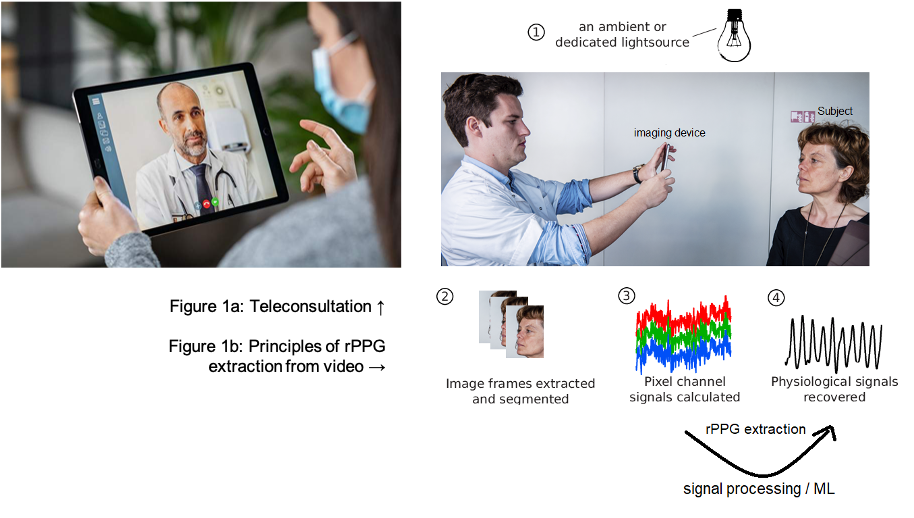MSc thesis project proposal
Contactless determination of vital parameters for improved healthcare (with Intelliprove)
Teleconsultations are making their entry everywhere around the world. They enable a quick check-up of a patient, without the usual waiting time and costs of a real-life consultation. Furthermore, they fit perfectly into the current transition to a more on-demand and patient-centered healthcare system.
However, not all procedures – even simple checkups – can be performed digitally, yet. Assessing a patient’s wellbeing solely based on a conversation during a video call is not easy and remains limited and subjective. In a real-life consultation, one of the first things a healthcare provider does, is to check the patient’s vital parameters. These include heart rate, blood pressure, oxygen saturation, respiratory rate and temperature. There’s a reason these vital signs include the word vital: they provide critical information about our bodies’ most basic functions and are key in determining health problems and making a diagnosis of the patient’s condition.
A contactless, optical way of determining vital parameters, through a smartphone camera, is therefore clearly of major value, allowing healthcare providers to perform a measurement during the teleconsultation itself and enabling them to immediately make an informed diagnosis.
Furthermore, such a technology can also greatly improve the speed and convenience of measuring vital parameters in real-life situations, such as in hospitals and retirement homes, and facilitate improvement of healthcare standards and awareness in lesser developed regions.
This thesis assignment will contribute to the development of this technology in collaboration with the Gent-based company Intelliprove.
Assignment
This thesis will focus on extracting a qualitative remote photoplethysmogram waveform from an optical measurement (video) of a person’s face. Photoplethysmography (rPPG) is an optical method to measure blood volume changes in body extremities such as the face or finger, which arise from the pulsation of the heart. The rPPG waveform, which is to be extracted from the facial video, lies at the basis of further steps for determining the vital parameters.
The thesis work will start with a literature review, to study the existing work on rPPG extraction methods and skin-reflection models. Within the scope of this thesis, different signal processing and/or machine learning techniques for rPPG extraction are to be explored and compared. The goal of the thesis is to finally realize a software implementation that transforms the raw video data into a qualitative rPPG waveform, which can be used to measure vital parameters such as heart rate and blood pressure. An extensive video dataset with corresponding ground truths will be provided to the student at the start of the thesis, which can be used to assess the performance and train models.
The final algorithm will be assessed by comparison to the ground truth PPG waveforms, obtained by reference devices such as pulse oximeters, and to an existing state-of-the-art rPPG extraction pipeline. Optionally, if time allows, the student can couple their framework with an existing algorithm that extracts heart rate and blood pressure from a PPG waveform, thus forming an end-to-end pipeline for the extraction of vital parameters starting from a scan of the face!
Requirements
We are looking for a student from electrical engineering, computer science or biomedical engineering. Experience with signal processing or machine learning is necessary. Good programming skills (in Python) are also required. Previous experience with biomedical signals, time series data and data analysis tools like Pandas is appreciated.
Contact
dr. Borbála Hunyadi
Signal Processing Systems Group
Department of Microelectronics
Last modified: 2022-02-23
